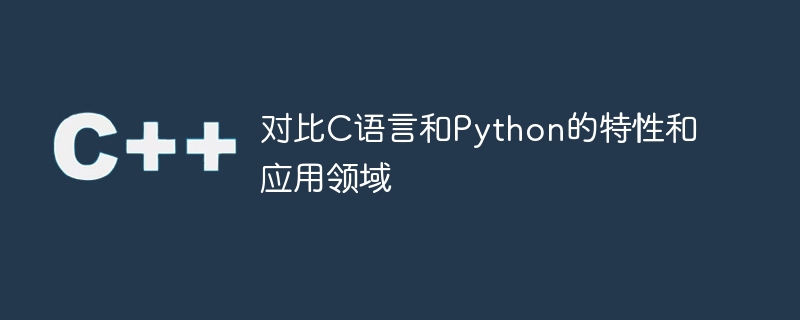Home >Backend Development >C++ >Compare the features and application areas of C language and Python
Compare the features and application areas of C language and Python
- PHPzOriginal
- 2024-03-19 09:21:03644browse

C language and Python are two commonly used programming languages. They have their own characteristics and are suitable for different application fields. This article will compare the features and application areas of C language and Python, and provide specific code examples to help readers better understand the use of the two languages.
1. C language features and application areas:
- Features:
C language is a programming language that is widely used in system programming and embedded development. It has the following features: Features: - Efficiency: C language has a very fast execution speed and is suitable for developing applications with high performance requirements.
- Strong control capabilities: C language provides a rich underlying operating interface, which can directly operate memory and hardware, making the management of system resources more flexible.
- Static type: Variable types need to be declared at compile time, which can optimize program performance and memory management.
- Application fields:
C language is suitable for the following fields: - Operating system development: Because C language has good performance and control capabilities, it is used in the development of operating system kernel and driver is widely used in.
- Embedded system development: C language can directly operate hardware resources and is suitable for developing embedded systems and embedded software.
- Game development: C language can achieve high-performance graphics rendering and physical simulation, and is suitable for the development of game engines and game logic.
The following is a simple C language sample code that calculates the sum of 1~10 and outputs the result:
#include <stdio.h>
int main() {
int sum = 0;
for (int i = 1; i <= 10; i ) {
sum = i;
}
printf("Sum of 1 to 10: %d
", sum);
return 0;
}2. Python features and application areas:
- Features:
Python is a high-level programming language with the following characteristics: - Concise and easy to read : Python syntax is simple and clear, suitable for rapid development and prototyping.
- Dynamic type: The variable type will be automatically determined at runtime, making it more flexible and convenient.
- Rich library support: Python has a huge standard library and third-party libraries that can implement many functions.
- Application fields:
Python is suitable for the following fields: - Web development: Python's web frameworks such as Django, Flask, etc. are widely used in website development and can quickly build efficient web applications. .
- Data analysis and scientific computing: Python's NumPy, Pandas and other libraries provide a wealth of data processing and analysis tools, suitable for the field of data science.
- Artificial intelligence and machine learning: Python's TensorFlow, PyTorch and other libraries support the implementation of machine learning and deep learning algorithms and are widely used in the field of artificial intelligence.
The following is a simple Python example code that calculates the sum of 1~10 and outputs the result:
sum = 0
for i in range(1, 11):
sum = i
print("Sum of 1 to 10:", sum)Summary:
C language is suitable for scenarios with high performance requirements and direct manipulation of hardware, while Python is suitable for rapid development, data processing and Scientific computing and other fields. The choice of which programming language to use should be determined based on specific application requirements and development goals, and can also be chosen based on the characteristics of the two languages.
The above is the detailed content of Compare the features and application areas of C language and Python. For more information, please follow other related articles on the PHP Chinese website!

